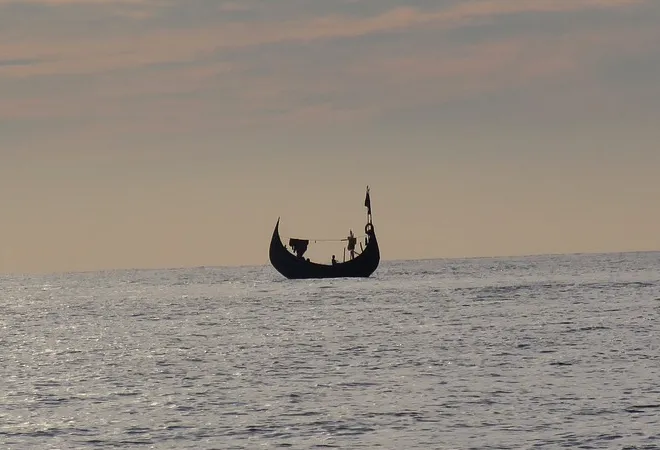 This piece is part of the essay series, Strategic High Tide in the Indo-Pacific: Economics, Ecology, and Security.
This piece is part of the essay series, Strategic High Tide in the Indo-Pacific: Economics, Ecology, and Security.
With the escalation of great power competition, much attention has been given to the rise of traditional security, or state-based, concerns. The challenges in this sphere still largely reside in the “what-if” space. As in, what if China were to do X? Or what does US-China competition mean for country Y? These are clearly important questions to ask. Yet, when discussing non-traditional security, or issues that go beyond purely state-based conceptions of security, stakeholders are dealing with challenges that are not a question of “what if,” but “when”.
In the Indo-Pacific region, cyclones and other natural disasters are a seasonal reality that climate change will only make more frequent and severe. As the
monsoon season strikes the Bay of Bengal, causing displacement and fatalities, it is an important time to reflect on what is working well in the region in terms of addressing non-traditional security challenges from environmental change—but also on what ongoing issues remain.
Bangladesh is a country that is especially prone to severe natural disasters, including infamous cyclones that have required international military response. Yet, the country has devoted much attention to improving its disaster resilience by establishing Coastal Crisis Management Centres and hundreds of cyclone shelters.
Bangladesh’s partnership with the United States (US) in establishing this capability was an important force multiplier. In addition to improving its own resilience, Bangladesh has increased its disaster response capability and become a provider of relief to smaller South Asian countries. In
2016, for example, the Bangladesh Navy delivered relief to Sri Lanka after widespread flooding and landslides. Bangladesh also delivered relief to the Maldives during its
2014 water crisis.
In addition to improving its own resilience, Bangladesh has increased its disaster response capability and become a provider of relief to smaller South Asian countries.
Sometimes, natural disasters are so severe that they require the provision of disaster relief by international military forces. There are usually a clear set of steps and conditions under which leaders will permit foreign armed forces to operate in their country. After receiving a formal request from the host nation, armed forces are expected to quickly get in, and then leave just as quickly after achieving their relief mission. Both India and the US have conducted successful disaster relief operations in the Bay of Bengal such as after the 1991 super cyclone and the 2004 tsunami. Yet, some host nations have displayed discomfort with offers of relief. Two cases in the Bay of Bengal demonstrate that when disaster relief is offered, it is not necessarily accepted.
After Cyclone Sidr struck Bangladesh in 2007, Indian’s disaster relief appears to have been restricted to the port of Chittagong and the airport in Dhaka. India’s Minister of External Affairs at the time,
Pranab Mukherjee, told journalists that his country offered to deploy helicopters to conduct rescue operations in affected areas, but Bangladesh declined. While Bangladesh was willing to accept relief in the naval domain and via fixed-wing aircraft, relief from India via rotary-wing aircraft in remote areas was not accepted.
Another example involves relief efforts after Cyclone Nargis struck Myanmar in 2008. The military junta did not permit the provision of naval relief by the US, even though the USS
Essex Expeditionary Strike Group sat in waters near Myanmar for
22 days. Yet, during this same period, the leadership in Myanmar trusted India and Thailand to dispatch their medical teams to help affected citizens. While US air force relief was permitted, US naval relief was not, demonstrating that
how relief is offered is an important consideration by a host nation.
After Cyclone Sidr struck Bangladesh in 2007, Indian’s disaster relief appears to have been restricted to the port of Chittagong and the airport in Dhaka.
These examples highlight the imperative of understanding host nation sensitivities in the aftermath of natural disasters. Yet, natural disasters are only one non-traditional security threat to the environment. Beyond the role that carbon emissions play in climate change, stakeholders should pay greater attention to preventing other anthropogenic crises in the Bay of Bengal that have both immediate and long-term impacts.
At the western edge of the Indian Ocean, Mauritius declared a “
state of environmental
emergency” in July 2020 after a ship ran aground and spilt oil. Not long afterward, the Bay of Bengal experienced a similar disaster; in September 2020, an oil tanker caught fire off the east coast of Sri Lanka and leaked diesel fuel over an area of 25 miles. Even worse, in May 2021, a container ship caught fire and subsequently sank, emptying its contents into the sea and ashore. At present, 400 pieces of
debris are estimated to sit on the seabed off Sri Lanka’s western coast. Also in 2021, debris from a
Chinese rocket fell into the Indian Ocean near Maldives.
Beyond the environmental effects, Sri Lanka and Maldives depend economically on tourism, which provides a much-needed source of foreign-exchange reserves.
The environmental impacts of such human-induced incidents are difficult to fully comprehend at this point. Beyond the environmental effects, Sri Lanka and Maldives depend economically on tourism, which provides a much-needed source of foreign-exchange reserves. Fish stocks are similarly vital for the livelihood of local populations.
The prevalence and importance of non-traditional security challenges in the Bay of Bengal are already well understood, and much progress has been made in building resilience. Still, in the case of providing disaster relief, major powers such as the US and India will need to continue being aware of the potential sensitivities of host nations in the aftermath of natural disasters. Furthermore, immediate human factors such as shipping accidents pose significant but overlooked threats to environmental security. Being proactive in mitigating the potential for human miscalculation, combined with increased disaster resilience, will help ameliorate the existing non-traditional security risk in the Bay of Bengal in the coming years.
The views expressed above belong to the author(s). ORF research and analyses now available on Telegram! Click here to access our curated content — blogs, longforms and interviews.



 This piece is part of the essay series,
This piece is part of the essay series,  PREV
PREV


